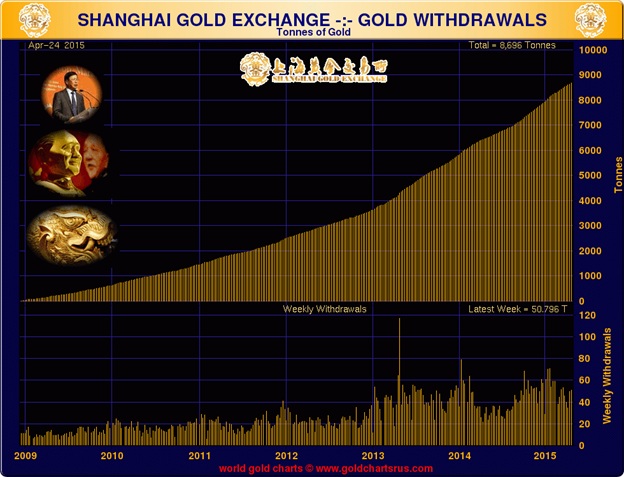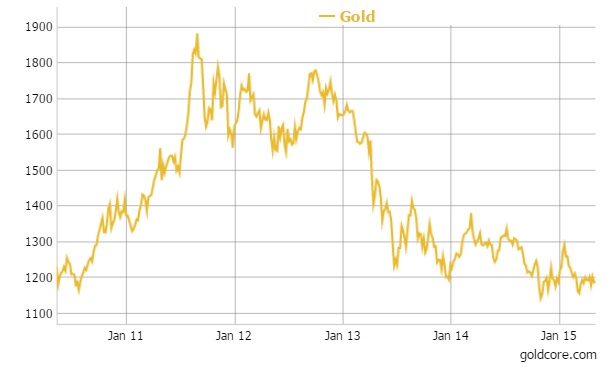China One Step Closer To Becoming World’s Gold Hub
- Shanghai Gold Exchange one step closer to becoming the globe’s major gold hub
- China tests system at Shanghai Gold Exchange (SGE) to establish yuan-denominated gold price fix
- SGE opened last year allowing trade in physical gold as opposed to electronic futures contracts on COMEX
- Yuan fix, which has broad regional support, will rival the century old LBMA fix
- China now world’s largest producer and buyer of gold
- Chinese government, central bank and people have affinity towards gold
- China tests system at Shanghai Gold Exchange (SGE) to establish yuan-denominated gold price fix
- SGE opened last year allowing trade in physical gold as opposed to electronic futures contracts on COMEX
- Yuan fix, which has broad regional support, will rival the century old LBMA fix
- China now world’s largest producer and buyer of gold
- Chinese government, central bank and people have affinity towards gold

Chinese
ambitions to become the world’s leading gold trading hub and
international financial hub have taken another step forward.
Trials were quietly conducted to launch a yuan-backed gold pricing benchmark last month, according to Reuters today.
China,
the world’s largest gold producer and buyer, feels its market weight
should entitle it to be a price setter for gold bullion. It is asserting
itself at a time when the established benchmark, the century old London
‘gold fix’, is under scrutiny because of long-running allegations of
price manipulation.
The new Chinese gold price benchmark may be launched before the end of the year.
The
Shanghai Gold Exchange (SGE) opened last year and trades in contracts
for physical gold (1 kilogram). It has quickly been establishing itself
as the fastest growing gold trading hub in the world as many
participants in the gold market move away from the COMEX.
Many
investors and miners have grown disillusioned with the COMEX system due
to concerns that the price of gold is being manipulated lower by
dumping contracts for vast amounts of gold onto the market which leads
to sharp price falls and curtails positive sentiment and momentum in the
gold market and reduces investment demand.
The
new yuan benchmark is set to rival the century old LBMA system. It has
broad regional support with the participation of foreign banks as well
as those from China including western banks.
“Top
Chinese banks including Industrial and Commercial Bank of China (ICBC)
and Bank of Communications are members of the exchange, along with
foreign banks Australia and New Zealand Banking Group, Standard
Chartered and HSBC, among others,” according to Reuters.
The
LBMA has been under pressure in recent years due to lack of
transparency in the price fixing process. While the yuan fix will be
determined by “members of SGE’s international board”, it will be against
a backdrop of contracts for physical gold trading at the SGE.
The
LBMA benchmark, on the other hand, is determined by bullion banks on
the basis of undisclosed “over the counter” trades. The LBMA said last
week it was considering the possibility of creating an exchange for gold
trading in the city, a shift away from the over the counter (OTC)
system.

SGE Gold Withdrawals – 50.796 tonnes for the week ending April 24th
The
LBMA has been engaged in a public relations campaign to regain its
credibility. The old system was reformed last year but the current
system is, however, little more transparent.
Central
banks are now being considered for membership of the LBMA. This will
further undermine the LBMA’s credibility among some participants in the
physical gold market given concerns that certain central banks may be
involved of gold price manipulation.
An
LBMA statement excuses the association from providing transparency,
stating, “the role of the central banks in the bullion market may
preclude ‘total’ transparency, at least at public level.”
At
the same time it should give extra clout to the besieged association
who, in their restructuring program, were forced to give some Chinese
banks seats on their board. These banks have no say, however, in
determining the benchmark.
The
move to establish a yuan-based gold pricing benchmark is only natural.
China is the world’s largest gold producer and officially the second
largest buyer of gold. Although many believe that China has surpassed
India in terms of gold demand and SGE withdrawals suggest this to be the
case.
As
Reuters report, “China … feels its market weight should entitle it to
be a price-setter for bullion and it is asserting itself at a time when
the established benchmark, the century-old London fix, is under scrutiny
because of alleged price-manipulation.”
It
will be very interesting to see how the SGE and the LBMA interact in
the coming years. The increasing importance of the SGE means that the
physical gold market should assume more importance, as should the
fundamentals of global physical supply and demand.
Shanghai
and the SGE is emerging as the leading international gold bullion
trading hub. This is a positive for gold due to the People’s Bank of
China (PBOC) and Chinese governments favourable stance towards gold.
A
favourable stance which is mirrored by the favourable disposition of
the Chinese people – culturally the Chinese view gold as an important
store of value.
MARKET UPDATE
Today’s AM LBMA Gold Price was USD 1,191.25, EUR 1,063.41 and GBP 785.22 per ounce.
Yesterday’s AM LBMA Gold Price was USD 1,187.40, EUR 1,070.94 and GBP 785.59 per ounce.
Yesterday’s AM LBMA Gold Price was USD 1,187.40, EUR 1,070.94 and GBP 785.59 per ounce.
Gold and silver saw small price gains yesterday of 0.35 and 0.73 per cent to $1,192.90 and $16.54 per ounce respectively.
In
Asia overnight, Singapore gold prices ticked higher initially prior to
giving up those gains and weakness has continued in London trading this
morning.
European stocks stabilised after Asian stocks fell today in
line with weak U.S. markets as equities investors were spooked by a
vicious selloff in sovereign bonds globally and a very largeU.S. trade deficit.
The disappointing U.S. trade data for March painted an even bleaker
economic picture of the first quarter and led to the dollar and stocks
coming under pressure.
The sudden spike in bond yields is
being mirrored by an equally rapid rally in resources. This means
investors globally are becoming less concerned about the risk of
deflation and more concerned about the risk of inflation or stagflation.
Oil prices rose again
today and are 15% above their recent lows. Prices are holding near
their 2015 highs, continuing a month-long rally that was supported by
renewed weakness in the dollar and a disruption to oil supplies from
Libya.

Gold in U.S. Dollars – 5 Years
Volumes in the global spot gold market
have fallen to their lowest in a year, with shrinking liquidity and a
slowdown in interbank trade making customers reluctant to transact on a
large scale
As the first week of May draws to a close, Reuters reports that “sales of gold American Eagle coins by the U.S. Mint have
had a relatively soft start to the month, with 4,500 oz of coins sold
so far (April’s total was 29,500 oz, down by a third from March). Silver Eagle coins have totalled 783,500 oz.
In
Europe in late morning trading gold bullion was flat at $1,192.44 an
ounce. Silver was down 0.6 percent at $16.51 an ounce and platinum fell
0.1 percent at $1,146 an ounce.
********
Courtesy of http://www.goldcore.com/us

No comments:
Post a Comment